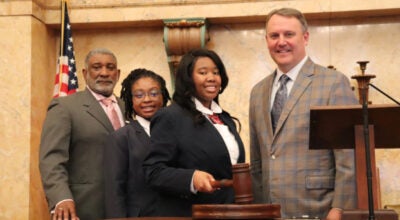Weeds again take over at Beulah
Published 12:00 am Friday, June 29, 2001
Weeds grow over Sidney Davis’ tombstone at Beulah Cemetery. (The Vicksburg Post/CHAD APPLEBAUM)
[06/29/01] Visitors to Beulah Cemetery still place flowers at markers, but weeds and grass have again overrun most of the historic graveyard.
The stone marking the life and death of Sidney Davis is adorned with plastic flowers, some arranged in the shape of a heart and others that spell out the word “Dad.” But the simply worded marker that notes Davis served in the U.S. Army during World War II, was born in 1909 and died in 1985 has become overgrown with weeds and vines in the month since the cemetery was last mowed.
The final resting place of Davis under a large oak tree is one of the easier graves to find at Beulah. Hundreds of others along the rolling hills are hidden by weeds that have grown nearly 5 feet tall in the weeks since a state preservation grant was used to get the cemetery cleared and then mowed.
“Every time it rains the grass grows an inch taller at least,” said Yolande Robbins, head of the committee that worked for a decade to get the clearing done in the spring accomplished.
Vicksburg maintains its public cemetery, Cedar Hill, with taxpayer dollars. The work in Beulah, on private land, required special legislative authorization for $50,000 in a bill that was pushed through by state Rep. George Flaggs, D-Vicksburg, in 1999.
Last month, a local contractor completed cutting and cleaning of the 15.8-acre cemetery at the east end of Martin Luther King Jr. Boulevard. By the time that work was finished in the second week of May, the grass had grown enough that the City of Vicksburg, charged with overseeing the use of the grant, hired Hill City Grass Services LLC to mow the cemetery again.
The initial clearing cost $20,000. That, plus the mowing, left the restoration committee with $24,125 remaining from the $50,000.
Committee members want to do more, including filling sunken graves and restoring an entrance sign, but the $24,000 is not enough.
The city advertised for bids to fill about 400 graves that have sunk feet below the level of the surrounding ground. But while the ad was placed and a bid was received within the budget for the project, the grass kept growing.
“I’m really to blame,” Robbins said. “Between that and everything else, I let that grass grow.”
Hill City submitted the only bid to fill in the graves at $20,000, but then withdrew its offer because the grass would have to be cut again just to identify what spots need filling. The committee had also planed to use $4,000 of the grant to restore the arch at the cemetery entrance.
Robbins said that while the committee decides what action to take next, the grass keeps growing.
“The dilemma we’re facing is that if we cut the grass again and then fill in the graves, before half of the graves are filled in the grass will need cutting again,” Robbins said.
A possible solution is to spray the cemetery with a chemical agent used at Cedar Hill and by the state highway department to slow the growth of weeds and grass. But the Mississippi Department of Archives and History has ruled that grant money cannot be used to spray, Robbins said.
After the area is sprayed, mowing that needs to be done every week or two could be done once a month, she said.
“If the spraying is not done we’re going to have to raise the money to cut the grass,” Robbins said.
The restoration committee has nearly $5,000 in the bank now from fund raisers and donations, but the cost of spraying the cemetery, $2,500, plus the cost of cutting the grass, filling in the sunken graves and restoring the arch will total $10,000 more than what is in the bank and the remaining grant funds.
Robbins said a deal has been reached between the city and Archives and History to keep from losing the rest of the grant at the end of the fiscal year Saturday. If the new administration, which takes office Sunday, will approve it, she said the committee wants to go ahead and cut the grass again and spray with the chemical to slow the growth.
But, in the meantime, the grass keeps growing.
“The community cannot expect the cemetery to be maintained by a state grant,” Robbins said. “People have got to get interested in that cemetery.”





